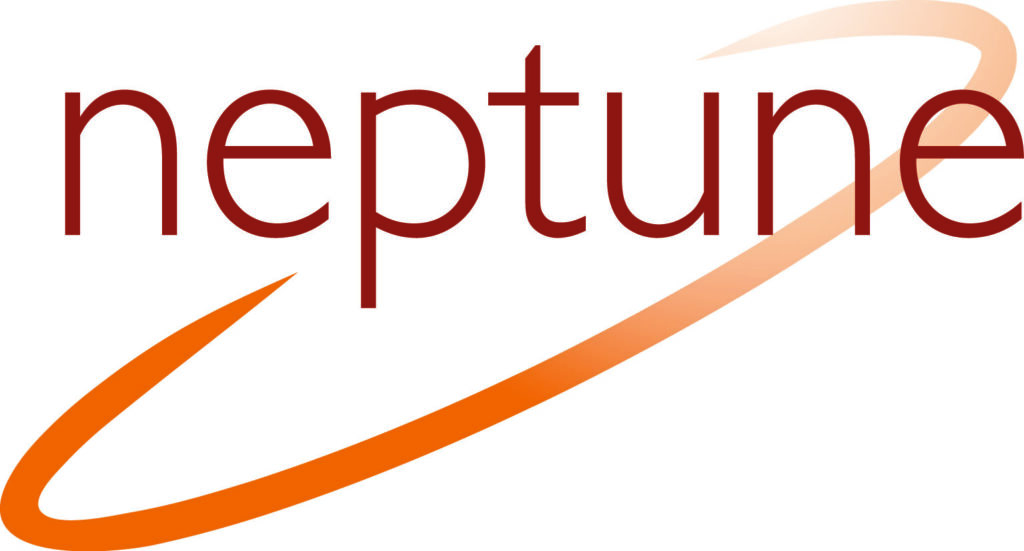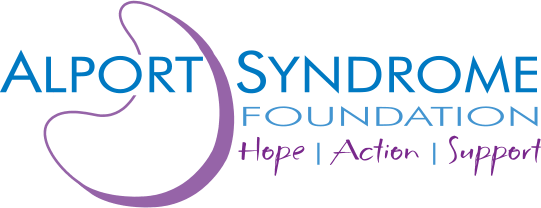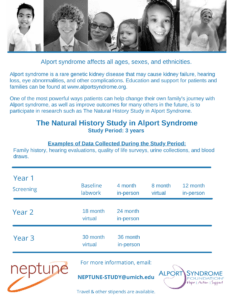Your Participation Advances Alport Research
In addition to patient registries, another critical patient data collection tool that feeds into clinical trials is a natural history study that includes human biological samples of patients over time. In the case of Alport syndrome, it is important to collect biosamples, including blood and urine, as well as clinical data such as blood pressure readings, hearing/ocular measurements, and family history.
Alport Syndrome Foundation has partnered with NEPTUNE, the Nephrotic Syndrome Study Network at the University of Michigan, to launch a natural history study in Alport syndrome.
Participation is open to Alport syndrome patients of all ages who have not yet experienced renal failure or received a kidney transplant. Patients who are part of an ongoing clinical trial are still eligible for this Alport syndrome natural history study.
The Principal Investigators for this natural history study are Dr. Michelle Rheault and Dr. Alessia Fornoni, both of whom are noted long-time Alport clinicians and researchers who serve on ASF’s Medical Advisory Committee. This natural history study aims to recruit up to 63 Alport patients of all ages (pediatric and adult) with diverse genetic mutations for a period of three years in total. Study site locations are available across the U.S., and travel stipends and reimbursements are part of the study plan (see Frequently Asked Questions at right for further details). Patients can remain on their current standard of treatment while participating in the study.
NEPTUNE’s efforts have been extremely effective in driving new clinical trials in kidney diseases. Many nationally noted experts in nephrology in the U.S., as well as outstanding junior investigators, are involved in NEPTUNE’s natural history studies. One of the major funding partners of NEPTUNE is the National Institutes of Health. Our partnership with NEPTUNE to develop this ancillary natural history study in Alport syndrome is extremely valuable to research.

In your email communication to NEPTUNE, please include your primary email address and a phone number to ensure a NEPTUNE representative can reach out with follow up information.
Click below for answers to Frequently Asked Questions about NEPTUNE
Natural history refers to studying the progression of a disease process in an individual over time, in the absence of a dedicated treatment. One of the reasons that natural history studies are so important is that they help a rare disease, such as Alport syndrome, to be better understood. It studies the hallmarks of the disease and how they progress over time, while unfolding patterns that might otherwise go unnoticed. These are generally observational in nature (versus an interventional study that might be included in a clinical trial) and longitudinal, meaning long-term.
The FDA published a set of guidelines addressing how natural history studies can be helpful in the development of drugs for rare diseases like ours. In sum:
- These studies help researchers better understand disease progression, how it’s managed by doctors, and what the unmet needs of the patients are.
- Identify pathways for clinical trial drugs using innovative mechanisms of action to treat rare diseases, some of which may already be approved for use in other diseases.
- Patients with known risk factors or biomarkers can be followed to help better understand the timing and potential of disease progression.
- These studies help researchers determine the ideal time to treat a patient with a specific therapy.
NEPTUNE is a research consortium of physician scientists at 25+ sites in the United States and Canada, along with patient advocacy groups NephCure Kidney International and the Halpin Foundation, and now with Alport Syndrome Foundation providing support and expertise through their ancillary study mechanism. NEPTUNE strives to bring the latest advances in research to patients diagnosed with Focal Segmental Glomerulosclerosis (FSGS), Minimal Changes Disease (MCD), Membranous Nephropathy (MN) and now Alport syndrome, with an overarching goal of utilizing precision medicine for rare diseases.
Participation is open to Alport syndrome patients of all ages who have not yet experienced renal failure or received a kidney transplant.
To learn more about NEPTUNE and be connected with a site near you, contact NEPTUNE by email: [email protected]
Click here to read our educational document. Any questions can be directed by email to [email protected]
Click below to download a full-sized flyer for patients about the study.

